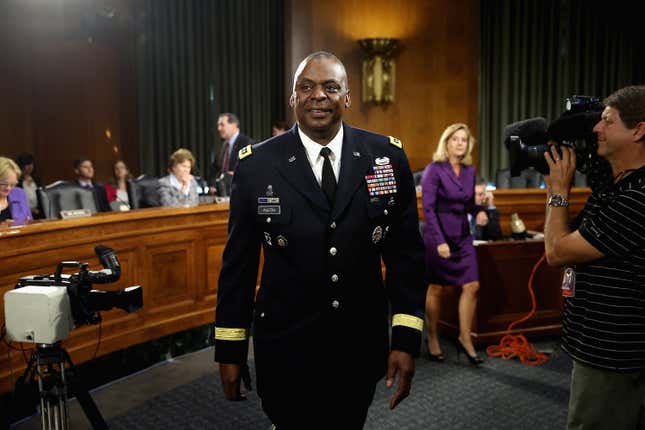
Black military groups are coming out in support of Gen. Lloyd Austin, President-elect Joe Biden’s pick as secretary of defense, as the retired four-star general faces what may be a tough confirmation process.
The issue isn’t necessarily Austin’s credentials. Austin, if confirmed, will be the first Black secretary of defense, and the trailblazing general has accrued a deep knowledge of America’s armed forces during his 40 years of military service. He graduated from the United States Military Academy at West Point, rising up through the ranks to become the first Black vice chief of staff of the Army. He also commanded the United States forces in Iraq, eventually overseeing the controversial and large-scale withdrawal of troops under the Obama administration. Austin is also the former director of the joint staff, which comprises each branch of the United States military.
But, like Gen. James Mattis before him, Austin has been out of military service less than the requisite seven years needed before assuming control of the nation’s armed forces (running the Pentagon was designed to be a civilian, not military, position). This will require a waiver from a partisan Senate that four years ago gave such a pass to Mattis, but grudgingly so, notes Politico.
Supporting Austin in the nomination process are Black military servicemen and women, including the National Montford Point Marine Association, a nonprofit affiliate organization named for the first African Americans to enlist in the U.S. Marine Corps.
In a letter written by NMPMA President Carmen Cole, the organization applauded Austin’s selection, noting the historic nature of his nomination. But, they stressed, Austin’s appointment could help the armed forces more directly confront systemic racism within its ranks, a longstanding issue in the nation’s military.
“As a longstanding veteran service organization charged with fostering and preserving the legacy of the first African Americans to enlist in the U.S. Marine Corps., we are concerned that there is very little Black representation in the highest ranks of the U.S. military,” Cole wrote in the letter. “Racial discrimination is part of our armed forces’ history and it is imperative that the next Secretary of Defense is prepared to address the systemic inequalities that still exist.”
Racial discrimination “absolutely” still impacts servicemen and women today, Cole told The Root over the phone last week.
“I can just say from my days of service, there were no senior Marines that I could look up to that looked like me. So to try to navigate through the ranks, through the schools and the opportunities was always difficult.”
She noted how, today, out of 82 general officers, only six are African American.
“And it’s been that way for years,” Cole stressed.
This lack of diversity among the military’s leadership came to the fore again this year after Black Lives Matter protests following the in-custody death of George Floyd in Minneapolis forced a deeper racial reckoning across the country. According to a Reuters investigation from September, stories of Black servicemen and women encountering racial bias are not unusual—the Air Force’s first Black chief of staff shared his own stories of discrimination recently. Throughout the country, Black service members and civilians serve on bases named for Confederate figureheads. And while civilian employees are able to file Equal Opportunity complaints to help address discrimination, Reuters found that uniformed military members were far less likely to file complaints. The issue wasn’t that bias didn’t exist, service members told the news outlet, but that the EO complaints weren’t effective. Worse, they could backfire on the person filing the paperwork: “filing an EO complaint is often viewed as an act of defiance in the military,” Reuters summarized.
This kind of discrimination is rarely framed as a national security issue, though it is worth considering how many able and talented service members find themselves sidelined for reasons that have nothing to do with their performance on the job and the larger impact this has on the nation’s military.
Cole and other Black current and former service members say Austin, as the first Black person to lead the Pentagon, would be both uniquely qualified and positioned to tackle systemic racism within the military.
As Politico writes, if confirmed, Austin will face a number of urgent issues on his first day in office, including overseeing distribution of crucial COVID-19 vaccines (his supporters point to his command of the Iraq drawdown, “the largest logistical operation undertaken by the Army in six decades,” as Biden said, as evidence of his day-one readiness). He will also need to address China’s growing military might, provide answers for how he would modernize the U.S. military and its operations, and establish his outlook on foreign policy and the growing security risks imposed by global climate change. Still, the issue of whether he will be granted the waiver necessary to make his confirmation possible has “set off more hand-wringing than other Biden pick,” Politico observes.
But for Black current and former military members like Cole, who’s served for 20 years, Austin’s nomination presents an exciting change for the military. Nearly 20 years out of the Marines, she’s confident that Austin will be able to oversee the Pentagon as a civilian: “His credentials speak for themselves.”

